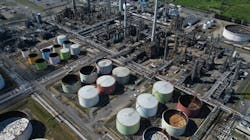Study considers southern North Sea carbon storage potential
Offshore staff
ABERDEEN, UK — The University of Aberdeen has identified areas of a gas super basin in the North Sea for carbon capture and storage (CCS).
A team from the University’s Centre for Energy Transition applied subsurface data and techniques derived from oil and gas exploration to assess the Anglo-Polish Super Basin in the southern North Sea as a future CCS hub for storing emitted CO2 in disused gas fields and other geological formations.
The two-year study, funded by the Net Zero Technology Centre, was led by Professor John Underhill, director of the Centre for Energy Transition, with support from specialists from Heriot Watt University in Edinburgh study. It examined the geological criteria that determine the subsurface areas with the greatest potential and the potential risks such as leaks from legacy wells.
Professor Underhill said, “The study highlights the areas where the best carbon stores are located and provides a basis to evaluate and rank sites.
“The study also has global relevance and application, and the workflow we have used has already been adopted by other countries. We have also used it to undertake studies in other parts of the UK as well as in Malaysia, Egypt and Brazil.”
Dr. Nick Richardson, head of Exploration & New Ventures at the UK’s North Sea Transition Authority, said, “By establishing a consistent regional geological framework, this work will assist the evaluation of storage sites within the southern North Sea, allowing the optimization of their exploitation and supporting assessments of risk and uncertainty. It will also aid regulatory and marine planning bodies in their ongoing efforts to identify synergies between offshore activities…”
08.01.2023
